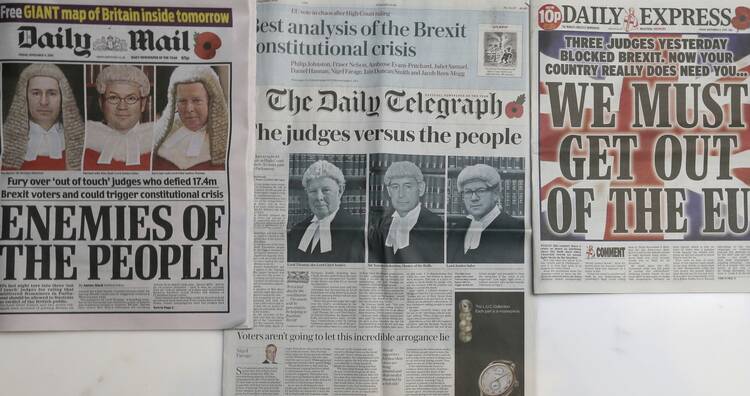“We want our country back” was one of the cries taken up by pro-Brexiteers, whose cause prevailed four months ago in the United Kingdom’s now infamous referendum to leave the European Union. This was an emotional rather than a rational cry because nobody had actually taken the country away, nor had any foreign troops invaded (indeed, nobody has tried that for quite a long time).
Now in a controversial ruling on Nov. 3 the High Court in London can be said to have, at least judicially, taken the country back. The court had been asked to bring U.K. constitutional law to bear on the question of what the referendum said and what it might, or might not, authorize the government to do next. Sovereignty is at stake; is parliament or a referendum sovereign?
What we thought was the probable next stage in the process to disentangle the United Kingdom from the European Union, the “Article 50” trigger of the formal start of Brexit negotiations, has been blocked by the court. It ruled that the government currently in power in Westminster, led by the rather beleaguered new Tory prime minister, Theresa May, cannot begin that process without an enabling Act of Parliament. The June referendum, following this view, was no more than consultative.
According to Number 10 Downing Street, the case will now go to the country’s supreme court. That will take at least a month to prepare and convene. Prime Minister May, who came to power after the “leave” referendum vote led to the collapse of the previous Tory administration, stated rather disingenuously that her government would not be deflected from starting the process in March 2017, despite the court’s ruling. She has been under heavy pressure to clarify her aims in those negotiations, if and when they take place, and has received criticism that there was no plan on how to leave. Some voices are now demanding an early general election, which should further complicate matters.
We have on our hands a major constitutional predicament.
Members of the Leave campaign had fumed about being forced to obey E.U. laws: U.K. courts alone should judge on U.K. matters, they thundered. Now some of those same people are in a frenzy at the judges’ presumption. The three High Court judges involved are under attack in the media. One national daily paper went as far as to label them “Enemies of the People.”
This new situation is every bit as perplexing as the situation the country found itself in after the June vote. The key principle of the U.K. constitution is that the government may not use the monarch’s powers, by means of the so-called Royal Prerogative, to change or abolish rights under British law unless parliament gives it authority to do so.
Parliamentarians, both Commons and Lords, are going to have to work out what weight they give to the referendum. Even if it were determined not to be binding, as a parliamentary vote would be, they must pay some attention to over 17 million votes cast to leave, which gave Brexit its slight, but clear majority.
Ultimately, this is a legal and constitutional crisis, not a political one; the judges sought to emphasize that they were not handing down a ruling on whether Britain should leave the European Union or not. Certain rights are, it is argued, at stake here: Invoking Article 50 would mean leaving the E.U. after around two years of negotiation, meaning that rights initially granted by parliament, notably free movement, would be taken away.
The High Court has exercised a historic role of defining the limits of the government’s power. In the reign of King James VI and I, the competing claims to legislative authority of the crown and the parliament caused much debate. The Gunpowder Plot—one that came close to blowing up Parliament, all its members and the visiting king that day—was discovered and thwarted on the fifth of November, 1605. The event is still commemorated on that date here as Bonfire Night, although many may not remember the why of the fires and fireworks on the fifth.
This week a cartoon on the masthead of the Tory-supporting Telegraph (which had run the “judges versus the people” headline) is a depiction of Guido (“Guy”) Fawkes, leader of that gunpowder conspiracy, caught in the act in the cellars of parliament. The two apprehending police officers advise him: “I’m afraid Parliament will have to vote before you light that fuse, Mr. Fawkes.”
Mutatis mutandis, that is where we are again, four centuries later.
David Stewart, S.J., is America's London correspondent.








